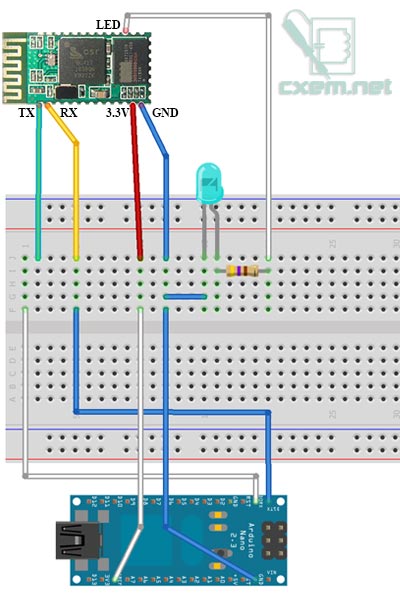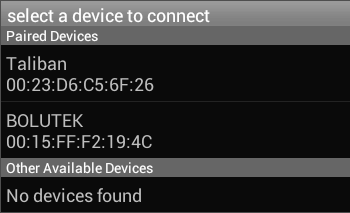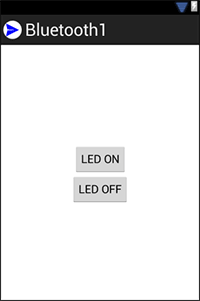Data transfer between Android and Arduino via Bluetooth
This article, shows two examples of working with Bluetooth: 1. Send data to Arduino 2. Data transfer between Android and Arduino.
Arduino
Wiring diagram is the same as in the previous article:

I use Arduino Nano V3 and Bluetooth module HC-06. Also, I connected the external LED to pin 12. Our program:
char incomingByte; // incoming data
int LED = 12; // LED pin
void setup() {
Serial.begin(9600); // initialization
pinMode(LED, OUTPUT);
Serial.println("Press 1 to LED ON or 0 to LED OFF...");
}
void loop() {
if (Serial.available() > 0) { // if the data came
incomingByte = Serial.read(); // read byte
if(incomingByte == '0') {
digitalWrite(LED, LOW); // if 1, switch LED Off
Serial.println("LED OFF. Press 1 to LED ON!"); // print message
}
if(incomingByte == '1') {
digitalWrite(LED, HIGH); // if 0, switch LED on
Serial.println("LED ON. Press 0 to LED OFF!");
}
}
}
Android
We will use the Java code with an explicit MAC-address of the device. Find MAC-address can be in the program for Android: Bluetooth Terminal:

Our device is "BOLUTEK" with MAC-address 00:15:FF:F2:19:4C.
The first program is very simple, the main activity will contain two buttons: turn on LED and turn off LED. Data transfer in the program will be implemented only on Android devices to Arduino

And our Java code of main activity:
package com.example.bluetooth1;
import java.io.IOException;
import java.io.OutputStream;
import java.lang.reflect.Method;
import java.util.UUID;
import com.example.bluetooth1.R;
import android.app.Activity;
import android.bluetooth.BluetoothAdapter;
import android.bluetooth.BluetoothDevice;
import android.bluetooth.BluetoothSocket;
import android.content.Intent;
import android.os.Build;
import android.os.Bundle;
import android.util.Log;
import android.view.View;
import android.view.View.OnClickListener;
import android.widget.Button;
import android.widget.Toast;
public class MainActivity extends Activity {
private static final String TAG = "bluetooth1";
Button btnOn, btnOff;
private BluetoothAdapter btAdapter = null;
private BluetoothSocket btSocket = null;
private OutputStream outStream = null;
// SPP UUID service
private static final UUID MY_UUID = UUID.fromString("00001101-0000-1000-8000-00805F9B34FB");
// MAC-address of Bluetooth module (you must edit this line)
private static String address = "00:15:FF:F2:19:5F";
/** Called when the activity is first created. */
@Override
public void onCreate(Bundle savedInstanceState) {
super.onCreate(savedInstanceState);
setContentView(R.layout.activity_main);
btnOn = (Button) findViewById(R.id.btnOn);
btnOff = (Button) findViewById(R.id.btnOff);
btAdapter = BluetoothAdapter.getDefaultAdapter();
checkBTState();
btnOn.setOnClickListener(new OnClickListener() {
public void onClick(View v) {
sendData("1");
Toast.makeText(getBaseContext(), "Turn on LED", Toast.LENGTH_SHORT).show();
}
});
btnOff.setOnClickListener(new OnClickListener() {
public void onClick(View v) {
sendData("0");
Toast.makeText(getBaseContext(), "Turn off LED", Toast.LENGTH_SHORT).show();
}
});
}
private BluetoothSocket createBluetoothSocket(BluetoothDevice device) throws IOException {
if(Build.VERSION.SDK_INT >= 10){
try {
final Method m = device.getClass().getMethod("createInsecureRfcommSocketToServiceRecord", new Class[] { UUID.class });
return (BluetoothSocket) m.invoke(device, MY_UUID);
} catch (Exception e) {
Log.e(TAG, "Could not create Insecure RFComm Connection",e);
}
}
return device.createRfcommSocketToServiceRecord(MY_UUID);
}
@Override
public void onResume() {
super.onResume();
Log.d(TAG, "...onResume - try connect...");
// Set up a pointer to the remote node using it's address.
BluetoothDevice device = btAdapter.getRemoteDevice(address);
// Two things are needed to make a connection:
// A MAC address, which we got above.
// A Service ID or UUID. In this case we are using the
// UUID for SPP.
try {
btSocket = createBluetoothSocket(device);
} catch (IOException e1) {
errorExit("Fatal Error", "In onResume() and socket create failed: " + e1.getMessage() + ".");
}
// Discovery is resource intensive. Make sure it isn't going on
// when you attempt to connect and pass your message.
btAdapter.cancelDiscovery();
// Establish the connection. This will block until it connects.
Log.d(TAG, "...Connecting...");
try {
btSocket.connect();
Log.d(TAG, "...Connection ok...");
} catch (IOException e) {
try {
btSocket.close();
} catch (IOException e2) {
errorExit("Fatal Error", "In onResume() and unable to close socket during connection failure" + e2.getMessage() + ".");
}
}
// Create a data stream so we can talk to server.
Log.d(TAG, "...Create Socket...");
try {
outStream = btSocket.getOutputStream();
} catch (IOException e) {
errorExit("Fatal Error", "In onResume() and output stream creation failed:" + e.getMessage() + ".");
}
}
@Override
public void onPause() {
super.onPause();
Log.d(TAG, "...In onPause()...");
if (outStream != null) {
try {
outStream.flush();
} catch (IOException e) {
errorExit("Fatal Error", "In onPause() and failed to flush output stream: " + e.getMessage() + ".");
}
}
try {
btSocket.close();
} catch (IOException e2) {
errorExit("Fatal Error", "In onPause() and failed to close socket." + e2.getMessage() + ".");
}
}
private void checkBTState() {
// Check for Bluetooth support and then check to make sure it is turned on
// Emulator doesn't support Bluetooth and will return null
if(btAdapter==null) {
errorExit("Fatal Error", "Bluetooth not support");
} else {
if (btAdapter.isEnabled()) {
Log.d(TAG, "...Bluetooth ON...");
} else {
//Prompt user to turn on Bluetooth
Intent enableBtIntent = new Intent(BluetoothAdapter.ACTION_REQUEST_ENABLE);
startActivityForResult(enableBtIntent, 1);
}
}
}
private void errorExit(String title, String message){
Toast.makeText(getBaseContext(), title + " - " + message, Toast.LENGTH_LONG).show();
finish();
}
private void sendData(String message) {
byte[] msgBuffer = message.getBytes();
Log.d(TAG, "...Send data: " + message + "...");
try {
outStream.write(msgBuffer);
} catch (IOException e) {
String msg = "In onResume() and an exception occurred during write: " + e.getMessage();
if (address.equals("00:00:00:00:00:00"))
msg = msg + ".\n\nUpdate your server address from 00:00:00:00:00:00 to the correct address on line 35 in the java code";
msg = msg + ".\n\nCheck that the SPP UUID: " + MY_UUID.toString() + " exists on server.\n\n";
errorExit("Fatal Error", msg);
}
}
}
Android - transmit and receive data to the Arduino
To receive data from Arduino, in Android application we need to use threads. On the main window activity we add a new element TextView, which will be used to display the received data from the Arduino
package com.example.bluetooth2;
import java.io.IOException;
import java.io.InputStream;
import java.io.OutputStream;
import java.lang.reflect.Method;
import java.util.UUID;
import com.example.bluetooth2.R;
import android.app.Activity;
import android.bluetooth.BluetoothAdapter;
import android.bluetooth.BluetoothDevice;
import android.bluetooth.BluetoothSocket;
import android.content.Intent;
import android.os.Build;
import android.os.Bundle;
import android.os.Handler;
import android.util.Log;
import android.view.View;
import android.view.View.OnClickListener;
import android.widget.Button;
import android.widget.TextView;
import android.widget.Toast;
public class MainActivity extends Activity {
private static final String TAG = "bluetooth2";
Button btnOn, btnOff;
TextView txtArduino;
Handler h;
final int RECIEVE_MESSAGE = 1; // Status for Handler
private BluetoothAdapter btAdapter = null;
private BluetoothSocket btSocket = null;
private StringBuilder sb = new StringBuilder();
private ConnectedThread mConnectedThread;
// SPP UUID service
private static final UUID MY_UUID = UUID.fromString("00001101-0000-1000-8000-00805F9B34FB");
// MAC-address of Bluetooth module (you must edit this line)
private static String address = "00:15:FF:F2:19:5F";
/** Called when the activity is first created. */
@Override
public void onCreate(Bundle savedInstanceState) {
super.onCreate(savedInstanceState);
setContentView(R.layout.activity_main);
btnOn = (Button) findViewById(R.id.btnOn); // button LED ON
btnOff = (Button) findViewById(R.id.btnOff); // button LED OFF
txtArduino = (TextView) findViewById(R.id.txtArduino); // for display the received data from the Arduino
h = new Handler() {
public void handleMessage(android.os.Message msg) {
switch (msg.what) {
case RECIEVE_MESSAGE: // if receive massage
byte[] readBuf = (byte[]) msg.obj;
String strIncom = new String(readBuf, 0, msg.arg1); // create string from bytes array
sb.append(strIncom); // append string
int endOfLineIndex = sb.indexOf("\r\n"); // determine the end-of-line
if (endOfLineIndex > 0) { // if end-of-line,
String sbprint = sb.substring(0, endOfLineIndex); // extract string
sb.delete(0, sb.length()); // and clear
txtArduino.setText("Data from Arduino: " + sbprint); // update TextView
btnOff.setEnabled(true);
btnOn.setEnabled(true);
}
//Log.d(TAG, "...String:"+ sb.toString() + "Byte:" + msg.arg1 + "...");
break;
}
};
};
btAdapter = BluetoothAdapter.getDefaultAdapter(); // get Bluetooth adapter
checkBTState();
btnOn.setOnClickListener(new OnClickListener() {
public void onClick(View v) {
btnOn.setEnabled(false);
mConnectedThread.write("1"); // Send "1" via Bluetooth
//Toast.makeText(getBaseContext(), "Turn on LED", Toast.LENGTH_SHORT).show();
}
});
btnOff.setOnClickListener(new OnClickListener() {
public void onClick(View v) {
btnOff.setEnabled(false);
mConnectedThread.write("0"); // Send "0" via Bluetooth
//Toast.makeText(getBaseContext(), "Turn off LED", Toast.LENGTH_SHORT).show();
}
});
}
private BluetoothSocket createBluetoothSocket(BluetoothDevice device) throws IOException {
if(Build.VERSION.SDK_INT >= 10){
try {
final Method m = device.getClass().getMethod("createInsecureRfcommSocketToServiceRecord", new Class[] { UUID.class });
return (BluetoothSocket) m.invoke(device, MY_UUID);
} catch (Exception e) {
Log.e(TAG, "Could not create Insecure RFComm Connection",e);
}
}
return device.createRfcommSocketToServiceRecord(MY_UUID);
}
@Override
public void onResume() {
super.onResume();
Log.d(TAG, "...onResume - try connect...");
// Set up a pointer to the remote node using it's address.
BluetoothDevice device = btAdapter.getRemoteDevice(address);
// Two things are needed to make a connection:
// A MAC address, which we got above.
// A Service ID or UUID. In this case we are using the
// UUID for SPP.
try {
btSocket = createBluetoothSocket(device);
} catch (IOException e) {
errorExit("Fatal Error", "In onResume() and socket create failed: " + e.getMessage() + ".");
}
// Discovery is resource intensive. Make sure it isn't going on
// when you attempt to connect and pass your message.
btAdapter.cancelDiscovery();
// Establish the connection. This will block until it connects.
Log.d(TAG, "...Connecting...");
try {
btSocket.connect();
Log.d(TAG, "....Connection ok...");
} catch (IOException e) {
try {
btSocket.close();
} catch (IOException e2) {
errorExit("Fatal Error", "In onResume() and unable to close socket during connection failure" + e2.getMessage() + ".");
}
}
// Create a data stream so we can talk to server.
Log.d(TAG, "...Create Socket...");
mConnectedThread = new ConnectedThread(btSocket);
mConnectedThread.start();
}
@Override
public void onPause() {
super.onPause();
Log.d(TAG, "...In onPause()...");
try {
btSocket.close();
} catch (IOException e2) {
errorExit("Fatal Error", "In onPause() and failed to close socket." + e2.getMessage() + ".");
}
}
private void checkBTState() {
// Check for Bluetooth support and then check to make sure it is turned on
// Emulator doesn't support Bluetooth and will return null
if(btAdapter==null) {
errorExit("Fatal Error", "Bluetooth not support");
} else {
if (btAdapter.isEnabled()) {
Log.d(TAG, "...Bluetooth ON...");
} else {
//Prompt user to turn on Bluetooth
Intent enableBtIntent = new Intent(BluetoothAdapter.ACTION_REQUEST_ENABLE);
startActivityForResult(enableBtIntent, 1);
}
}
}
private void errorExit(String title, String message){
Toast.makeText(getBaseContext(), title + " - " + message, Toast.LENGTH_LONG).show();
finish();
}
private class ConnectedThread extends Thread {
private final InputStream mmInStream;
private final OutputStream mmOutStream;
public ConnectedThread(BluetoothSocket socket) {
InputStream tmpIn = null;
OutputStream tmpOut = null;
// Get the input and output streams, using temp objects because
// member streams are final
try {
tmpIn = socket.getInputStream();
tmpOut = socket.getOutputStream();
} catch (IOException e) { }
mmInStream = tmpIn;
mmOutStream = tmpOut;
}
public void run() {
byte[] buffer = new byte[256]; // buffer store for the stream
int bytes; // bytes returned from read()
// Keep listening to the InputStream until an exception occurs
while (true) {
try {
// Read from the InputStream
bytes = mmInStream.read(buffer); // Get number of bytes and message in "buffer"
h.obtainMessage(RECIEVE_MESSAGE, bytes, -1, buffer).sendToTarget(); // Send to message queue Handler
} catch (IOException e) {
break;
}
}
}
/* Call this from the main activity to send data to the remote device */
public void write(String message) {
Log.d(TAG, "...Data to send: " + message + "...");
byte[] msgBuffer = message.getBytes();
try {
mmOutStream.write(msgBuffer);
} catch (IOException e) {
Log.d(TAG, "...Error data send: " + e.getMessage() + "...");
}
}
}
}
Video:
Code updated: 28.01.2013
Download APK-files for Android: bluetooth1.apk and bluetooth2.apk
Download source code for Arduino and Android
Author: Koltykov A.V.






